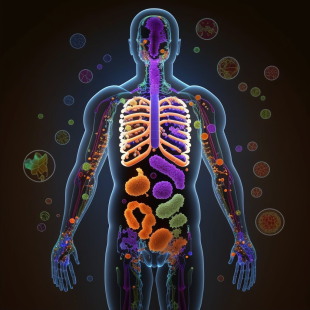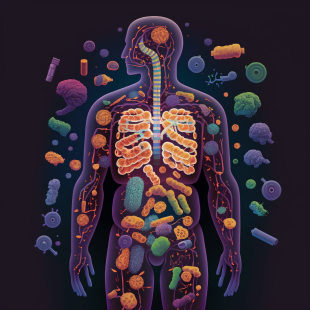
Introduction
The gut microbiome refers to the diverse community of microorganisms, including bacteria, viruses, and fungi, that reside in the gastrointestinal tract. This microbiome plays a crucial role in maintaining overall health and well-being. In fact, it is now considered to be a key factor in many aspects of health, from digestion and immune function to mental health and chronic disease prevention.
In the introduction of the article, it is important to provide readers with a basic understanding of the gut microbiome and its importance. This could include a brief explanation of the types of microorganisms found in the gut, as well as the various functions they perform. It may also be helpful to provide some statistics or examples of how the gut microbiome affects health, such as the fact that it is estimated to contain up to 100 trillion microorganisms.
The introduction should also serve as a brief overview of what readers can expect to learn from the article. This could include an outline of the main topics covered, such as the role of the gut microbiome in overall health, how to support a healthy gut microbiome, and specific medical conditions related to gut health. By providing a clear outline of the article, readers will be more likely to engage with the content and understand its relevance to their own health and well-being.
What is the Gut Microbiome?
The gut microbiome refers to the complex and diverse community of microorganisms that inhabit the gastrointestinal tract of humans and other animals. These microorganisms play a crucial role in digestion, immune function, and overall health.
- Composition of the gut microbiome
The gut microbiome is composed of a wide variety of microorganisms, including bacteria, viruses, and fungi. The majority of these microorganisms are bacteria, which can be further classified into different types or species. Some of the most common bacterial species found in the gut include Bacteroidetes, Firmicutes, and Actinobacteria. - Factors that influence the gut microbiome
Several factors can influence the composition and function of the gut microbiome. These include genetics, diet, medications, age, and environmental factors such as exposure to toxins and pollution. For example, a high-fiber diet can promote the growth of beneficial bacteria in the gut, while a diet high in sugar and processed foods can lead to an overgrowth of harmful bacteria. Antibiotics and other medications can also disrupt the balance of the gut microbiome by killing off beneficial bacteria.
It is important to provide readers with a comprehensive understanding of what the gut microbiome is, what it is made up of, and what factors can influence its composition and function. This will lay the foundation for the rest of the article and help readers understand why the gut microbiome is so important for overall health and well-being.

The Role of the Gut Microbiome in Overall Health
- Digestive function and nutrient absorption
One of the primary functions of the gut microbiome is to aid in digestion and nutrient absorption. The microorganisms in the gut help break down food and extract nutrients that the body needs to function properly. They also produce enzymes that can break down certain compounds that the body cannot digest on its own, such as fiber. - Immune system function
The gut microbiome also plays a critical role in immune system function. The microorganisms in the gut interact with immune cells to help regulate immune responses and prevent infections. They also produce compounds that can stimulate the growth of beneficial bacteria and inhibit the growth of harmful bacteria. - Brain-gut connection
There is a strong connection between the gut and the brain, often referred to as the gut-brain axis. The gut microbiome can influence the functioning of the brain and vice versa. For example, certain bacteria in the gut can produce neurotransmitters such as serotonin and dopamine, which can affect mood and mental health. - Influence on mood and mental health
Studies have found that the gut microbiome can have a significant impact on mood and mental health. Imbalances in the gut microbiome have been linked to conditions such as depression, anxiety, and even autism spectrum disorders. Researchers believe that this may be due in part to the gut-brain axis, as well as the influence of the gut microbiome on the immune system and inflammation. - Link to chronic diseases, including obesity, diabetes, and autoimmune diseases
There is growing evidence to suggest that imbalances in the gut microbiome may play a role in the development of chronic diseases, including obesity, type 2 diabetes, and autoimmune diseases. For example, studies have found that people with obesity tend to have a different composition of gut bacteria than people who are lean. Researchers are still exploring the mechanisms behind these associations, but it is thought that the gut microbiome may influence metabolism and inflammation, both of which are implicated in the development of these diseases.
This section explores the various ways in which the gut microbiome can impact overall health and well-being, from digestive function and immune system function to mental health and the development of chronic diseases. By understanding the many roles that the gut microbiome plays in the body, readers will gain a deeper appreciation for why it is so important to take care of this essential ecosystem.
How to Support a Healthy Gut Microbiome A. Diet and nutrition
- Importance of fiber and prebiotics: Explain how dietary fiber and prebiotics play a critical role in supporting a healthy gut microbiome. Include examples of high-fiber foods and prebiotics that can be easily incorporated into the diet.
- Foods that support a healthy gut microbiome: Discuss specific foods that are beneficial for gut health, including fermented foods such as yogurt, kefir, kimchi, and sauerkraut. Provide scientific evidence for the benefits of these foods and their impact on gut microbiome diversity.
- Lifestyle changes
- Exercise: Explain the positive impact of physical activity on gut health and the gut microbiome. Discuss how exercise can help to promote a more diverse microbiome and reduce inflammation.
- Stress reduction techniques: Discuss the relationship between stress and the gut microbiome. Provide examples of stress reduction techniques that can help to support a healthy gut microbiome, such as meditation, deep breathing, and yoga.
- Antibiotic use and alternatives: Explain how antibiotics can disrupt the gut microbiome and lead to dysbiosis. Provide alternatives to antibiotics, such as probiotics, herbal remedies, and lifestyle changes, that can help to support a healthy gut microbiome.
- Other factors that can influence the gut microbiome
- Age and development: Explain how the gut microbiome changes over the course of a person's life, from infancy to adulthood.
- Environmental factors: Discuss how environmental factors, such as pollution and exposure to chemicals, can impact the gut microbiome.
- Genetics: Explain how a person's genetics can influence the composition and function of their gut microbiome.
- Medications: Discuss how certain medications, such as proton pump inhibitors and nonsteroidal anti-inflammatory drugs (NSAIDs), can impact the gut microbiome.
- Sleep: Explain how sleep can impact the gut microbiome and provide tips for improving sleep hygiene.
- Testing and Monitoring the Gut Microbiome
- Gut microbiome testing: Discuss the various types of gut microbiome testing that are available, including stool testing and microbiome analysis.
- Monitoring the gut microbiome: Explain the importance of monitoring changes in the gut microbiome and how to do so, including tracking changes in bowel movements, symptoms, and overall health.

Gut Health and Medical Conditions
Specific medical conditions related to the gut microbiome, including Irritable Bowel Syndrome (IBS), Inflammatory Bowel Disease (IBD), and Small Intestinal Bacterial Overgrowth (SIBO)
- Irritable Bowel Syndrome (IBS)
- Symptoms of IBS
- Link between IBS and the gut microbiome
- Role of diet and probiotics in managing IBS
- Inflammatory Bowel Disease (IBD)
- Types of IBD (Crohn's disease and ulcerative colitis)
- Gut microbiome dysbiosis in IBD
- Treatment options, including antibiotics and fecal microbiota transplantation
- Small Intestinal Bacterial Overgrowth (SIBO)
- Causes of SIBO
- Symptoms and diagnosis of SIBO
- Treatment options, including antibiotics and dietary changes
Treatments and management strategies for these conditions
- Importance of a personalized approach to treatment
- Role of diet and nutrition in managing gut-related conditions
- Use of probiotics and prebiotics in restoring gut microbiome balance
- Other potential treatments, including antibiotics and fecal microbiota transplantation
The Future of Gut Microbiome Research
A. Overview of current gut microbiome research B. Emerging technologies and techniques for studying the gut microbiome C. Potential future applications for gut microbiome research, including personalized medicine and disease prevention D. Ethical considerations in gut microbiome research
As our understanding of the gut microbiome continues to grow, researchers are exploring new technologies and techniques to better understand its role in human health. These include advanced sequencing techniques, which allow scientists to analyze the genetic material of gut bacteria in greater detail, and microbiome transplants, which involve transferring healthy bacteria from one person to another to treat certain medical conditions.
One promising area of research is the development of personalized medicine based on an individual's gut microbiome. By analyzing an individual's unique microbiome composition, doctors may be able to develop personalized treatment plans for a range of medical conditions, from obesity to cancer.
However, as with any emerging field of research, there are ethical considerations to be aware of. For example, microbiome transplants involve transferring live bacteria from one person to another, which raises questions about informed consent, safety, and potential risks.
Overall, the future of gut microbiome research is promising, with the potential to transform our understanding of human health and disease prevention.
Conclusion
The gut microbiome plays a crucial role in overall health and well-being, influencing everything from digestion and nutrient absorption to immune system function and mental health. Supporting a healthy gut microbiome through diet, lifestyle changes, and medical treatment can have significant benefits for those with gut-related medical conditions and for anyone looking to improve their overall health. As research on the gut microbiome continues to advance, it is important to stay informed and take proactive steps to support this essential aspect of our health.
